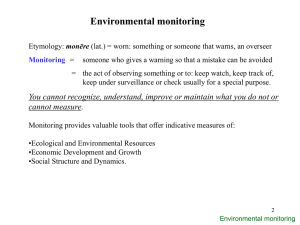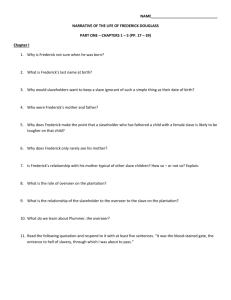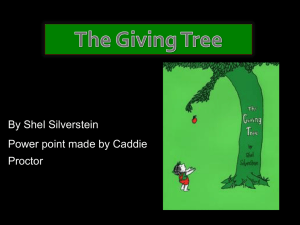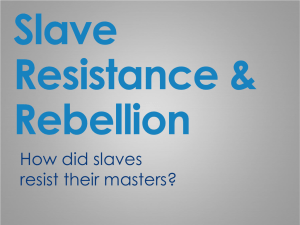Father and Mother Could Not Save Me HW
advertisement
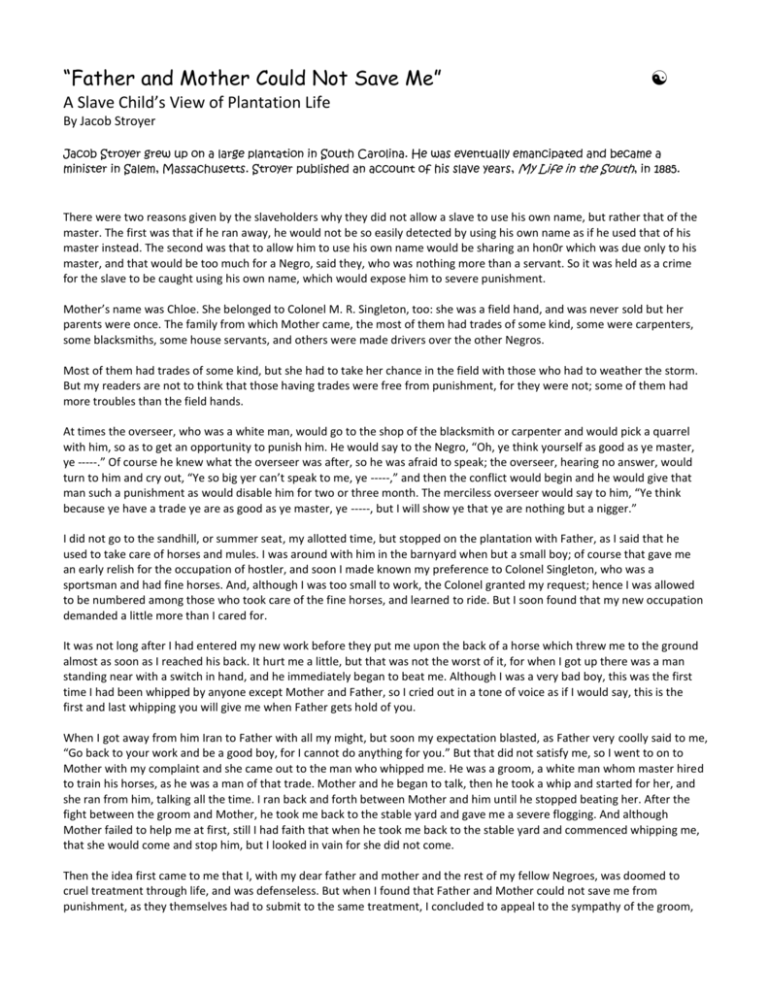
“Father and Mother Could Not Save Me” A Slave Child’s View of Plantation Life By Jacob Stroyer Jacob Stroyer grew up on a large plantation in South Carolina. He was eventually emancipated and became a minister in Salem, Massachusetts. Stroyer published an account of his slave years, My Life in the South, in 1885. There were two reasons given by the slaveholders why they did not allow a slave to use his own name, but rather that of the master. The first was that if he ran away, he would not be so easily detected by using his own name as if he used that of his master instead. The second was that to allow him to use his own name would be sharing an hon0r which was due only to his master, and that would be too much for a Negro, said they, who was nothing more than a servant. So it was held as a crime for the slave to be caught using his own name, which would expose him to severe punishment. Mother’s name was Chloe. She belonged to Colonel M. R. Singleton, too: she was a field hand, and was never sold but her parents were once. The family from which Mother came, the most of them had trades of some kind, some were carpenters, some blacksmiths, some house servants, and others were made drivers over the other Negros. Most of them had trades of some kind, but she had to take her chance in the field with those who had to weather the storm. But my readers are not to think that those having trades were free from punishment, for they were not; some of them had more troubles than the field hands. At times the overseer, who was a white man, would go to the shop of the blacksmith or carpenter and would pick a quarrel with him, so as to get an opportunity to punish him. He would say to the Negro, “Oh, ye think yourself as good as ye master, ye -----.” Of course he knew what the overseer was after, so he was afraid to speak; the overseer, hearing no answer, would turn to him and cry out, “Ye so big yer can’t speak to me, ye -----,” and then the conflict would begin and he would give that man such a punishment as would disable him for two or three month. The merciless overseer would say to him, “Ye think because ye have a trade ye are as good as ye master, ye -----, but I will show ye that ye are nothing but a nigger.” I did not go to the sandhill, or summer seat, my allotted time, but stopped on the plantation with Father, as I said that he used to take care of horses and mules. I was around with him in the barnyard when but a small boy; of course that gave me an early relish for the occupation of hostler, and soon I made known my preference to Colonel Singleton, who was a sportsman and had fine horses. And, although I was too small to work, the Colonel granted my request; hence I was allowed to be numbered among those who took care of the fine horses, and learned to ride. But I soon found that my new occupation demanded a little more than I cared for. It was not long after I had entered my new work before they put me upon the back of a horse which threw me to the ground almost as soon as I reached his back. It hurt me a little, but that was not the worst of it, for when I got up there was a man standing near with a switch in hand, and he immediately began to beat me. Although I was a very bad boy, this was the first time I had been whipped by anyone except Mother and Father, so I cried out in a tone of voice as if I would say, this is the first and last whipping you will give me when Father gets hold of you. When I got away from him Iran to Father with all my might, but soon my expectation blasted, as Father very coolly said to me, “Go back to your work and be a good boy, for I cannot do anything for you.” But that did not satisfy me, so I went to on to Mother with my complaint and she came out to the man who whipped me. He was a groom, a white man whom master hired to train his horses, as he was a man of that trade. Mother and he began to talk, then he took a whip and started for her, and she ran from him, talking all the time. I ran back and forth between Mother and him until he stopped beating her. After the fight between the groom and Mother, he took me back to the stable yard and gave me a severe flogging. And although Mother failed to help me at first, still I had faith that when he took me back to the stable yard and commenced whipping me, that she would come and stop him, but I looked in vain for she did not come. Then the idea first came to me that I, with my dear father and mother and the rest of my fellow Negroes, was doomed to cruel treatment through life, and was defenseless. But when I found that Father and Mother could not save me from punishment, as they themselves had to submit to the same treatment, I concluded to appeal to the sympathy of the groom, who seemed to have full control over me. But my pitiful cries never touched his sympathy, for things seemed to grow worse rather than better; so I made up my mind to stem the storm the best I could. One day, about two weeks after Boney Young and Mother had the conflict, he . . . gave me a first-class flogging. That evening when I went home to Father and Mother, I said to them, “Mr. Young is whipping me too much now; I shall not stand it. I shall fight him.” Father said to me, “You must not do that, because if you do he will say that your mother and I advised you to do it, and it will make it hard for Mother and me, as well as for yourself. You must do as I told you, my son; do your work and he best you can, and do not say anything.:” I said to Father, “But I don’t know what I have done that he should whip me; he does not tell me what wrong I have done, he simply calls me to him and whips me when he gets ready.” Father said, “I can do nothing more than pray to the Lord to hasten the time when these things shall be done away; that is all I can do.” Wen Mother stripped me and looked at the wounds that were upon me, she burst into tears and said, “If he were not so small I would not mind it so much; this will break his constitution. I am going to master about it, because I know he will not allow Mr. Young to treat this child so.” And I thought to myself that had Mother gone to master about it, it would have helped me some, for he and she grew up together and he thought a great deal of her. But Father said to Mother, “You better not go to Master, for while he might stop the child from being treated badly, Mr. Young may revenge himself through the overseer, for you know that they are very friendly to each other.” So said Father to Mother, “You would gain nothing in the end/ he best thing for us to do is t0 pray much over it, for I believe that the time will come when this boy with the rest of the children will be free, though we may not live to see it.” Questions: 1. What were the two reasons slaves could not use their surnames? 2. Were slaves always punished for a wrong doing? Explain. 3. Why did the slave boy run to his father? What was his father’s response? 4. What did the slave boy finally realize his parents? 5. What advice did the father give to his son about standing up for himself? 6. Imagine you were one of Jacob’s parents. What would be going through your mind as you listened to your son complain about his treatment? How would you react?

